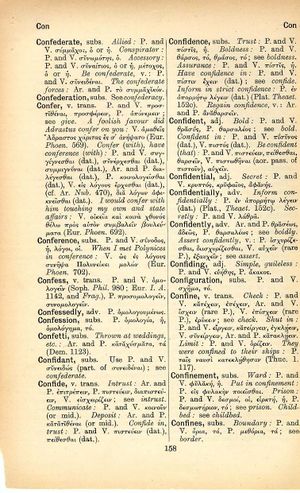confine: Difference between revisions
From LSJ
(D_2) |
(Gf-D_2) |
||
| Line 1: | Line 1: | ||
{{Woodhouse1 | {{Woodhouse1 | ||
|Text=[[File:woodhouse_158.jpg|thumb|link= | |Text=[[File:woodhouse_158.jpg|thumb | ||
|link={{filepath:woodhouse_158.jpg}}]]'''v. trans.''' | |||
<b class="b2">Check</b>: P. and V. κατέχειν, ἐπέχειν, Ar. and V. ἴσχειν (rare P.), V. ἐπίσχειν (rare P.), ἐρύκειν; see [[check]]. | <b class="b2">Check</b>: P. and V. κατέχειν, ἐπέχειν, Ar. and V. ἴσχειν (rare P.), V. ἐπίσχειν (rare P.), ἐρύκειν; see [[check]]. | ||
Revision as of 07:31, 14 August 2017
English > Greek (Woodhouse)
v. trans.
Check: P. and V. κατέχειν, ἐπέχειν, Ar. and V. ἴσχειν (rare P.), V. ἐπίσχειν (rare P.), ἐρύκειν; see check.
Shut in: P. and V. εἴργειν, κατείργειν, ἐγκλῄειν, V. συνείργειν, Ar. and P. κατακλῄειν.
Limit: P. and V. ὁρίζειν.
They were confined to their ships: P. ταῖς ναυσὶ κατεκλῄθησαν (Thuc. 1. 117).
Latin > French (Gaffiot 2016)
cōnfīnĕ, is, n.,
1 partie qui avoisine, voisinage : Luc. 6, 649 ; Val. Flacc. 6, 374
2 = homœoteleuton : Carm. fig. 100.

